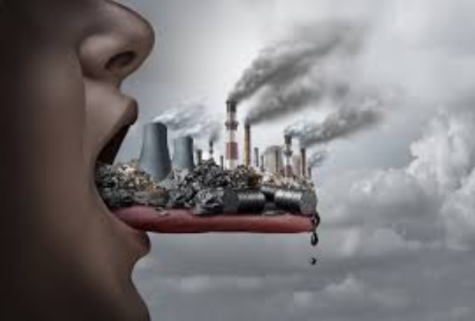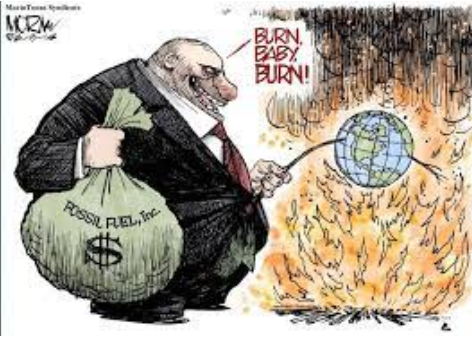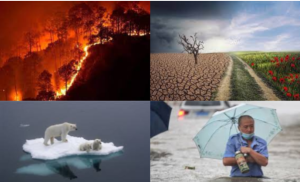The addiction behind fossil fuels

What Are Fossil Fuels?
According to National Geographic, “Fossil fuels are made from decomposing plants and animals. These fuels are found in the Earth’s crust and contain carbon and hydrogen, which can be burned for energy. Coal, oil, and natural gas are examples of fossil fuels.” It is a nonrenewable source of energy, meaning once they are used it can not be replaced. The term fossil fuels are fitting; it is referring to plants and animals that have been on the earth for millions of years. There are many different techniques that can be used in order to extract fossil fuels; one of the most commonly used methods is fracking. Fracking is the process in which machines crack open the Earth’s surface and widen underground by injecting water, chemicals, and sand at a high pressure causing the gas to flow through the machine and back into the tanks where they would store their extracted fossil fuel. Fracking can be extremely dangerous when safety regulations are being mistreated or ignored. The oils and gas are used in our everyday world, from our kitchen to our cars, to factories and simple machines. They release carbon emissions that create the greenhouse effect, which causes climate change. To extract our everyday need for fossil fuels we know that Fracking is a big help but it can fall into one of two main categories we use; Mining and drilling. The main difference is that mining is more of a direct digging underground to extract coal and other fossil fuels and drilling is when that can be done from above ground. An article from wilderness.org explains how fracking can poison groundwater, pollute surface water, impair wild landscapes, and threaten wildlife.
Why are Fossil Fuels So Deadly to the Earth and our Ecosystems?
According to the Environmental and Energy Study Institute Fact Sheet for 2021
Fossil fuels can impact
- Ocean acidification
- Extreme Weather
- Sea Level Rise
- Plastic Pollution
- Air Pollution
- Water Pollution
- Oil Spills
- Health Issues
Global temperatures worldwide have already been warmed by 2F since the 1800s, and while that may not seem like much, Ice caps are melting and entire countries and cities are starting to see a rise in temperature. In places like the Netherlands, people have observed that their summers have barely reached 40 degrees. In the Northern countries and cities, there are expected to be extended heat waves and a rise in the rainwater levels, sea level, and temperature. (The sea level is rising due to a rise in temperature in cold places causing ice caps to melt and more water into the ocean). Then in other parts of the world, you have places like Pakistan which is having severe flooding but right next door China has been having a drought for more than 70 days and still continuing. The flooding has displaced over 33million people and has killed over one thousand and is expected to continue to rise as time continues.
Fossil Fuels also are the cause of another major worldwide issue: Plastic. According to a Fact sheet by EESI, “Over 99 percent of plastics are made from fossil fuels. Globally, 300 million tons of plastic waste are produced each year, 14 million tons of which end up in the ocean, killing wildlife and polluting the food chain,” In addition, the article expands on topics specifically on how fossil fuels may seem like no big deal, but when the numbers are being brought out and the hard facts are given, the urgency becomes more apparent.

What are we really doing to stop it?
The world governments propose that they have plans to get to net zero, reduce emissions, or find alternative ways to produce and use renewable energy. The hard truth is that it is never going to happen. In reality, there are about 12.6 million people working in fossil fuel industries, which means that there are millions of people that would be put out of jobs if fossil fuels were even sized down. Not to mention the fact that the rest of the world, let alone the United States or the people in your own community would have to agree to limit or eliminate fossil fuels. It serves as a function in everyday life and due to the world’s population, it is also much needed. It would cost trillions of dollars to just replace some of the fossil fuel business with renewable energy.
The world is full of money-hungry people and people who need things to happen to them personally, but the problem with that is it becomes too late by the time they realize that our earth is being destroyed. The World Government has been trying to get on the course of getting to net zero by the year 2050 but that simply is not going to happen because the gas business and other industries will simply not allow that to happen. You are talking about changing the way not only one country but the whole world is doing. Most of the world is so blind to what is going on outside of their bubble (whether their bubble is good or bad), that they are just living to live and don’t care about what’s happening to our planet as a whole. If you ask a person who is living in a multimillion-dollar home what’s going on in Pakistan or the rise in temperature in the Northern Countries, 8/10 there is not going to know a thing. That goes for the same as any other person who could be middle class or dead poor who simply blocks out the world. Getting billions of people to care about the picture is simply impossible no matter how powerful a person may be. The only way to grab someone like that is to have something of theirs taken away by the cause of the concern, which in this case would be fossil fuels.

Yes, there are scientists and environmental groups that start non-profits or publish appearances about the hard truth, but in today’s society do you think that the media would draw attention to that? Better yet, do you think world leaders would risk the majority of their citizens to figure out what is really going on? Even when it gets published it gets buried, when a live press conference or interview is constructed the reporters’ jobs are to size down the scale of the problem so that the seriousness of the problem will not cause any panic. We as a society have to realize that the things that we ‘need’ and use every day are the cause of the destruction of our Earth and will cause thousands and in the future millions of casualties but nothing will end because the problem is not smacking us in the face. Achieving net zero emissions means having no greenhouse gasses in the atmosphere.
According to Based On Science. “Achieving net-zero emissions means that some greenhouse gasses are still released, but these are offset by removing an equivalent amount of greenhouse gasses from the atmosphere and storing it permanently in soil, plants, or materials. Because it would be prohibitively expensive or disruptive to eliminate some sources of emissions entirely, achieving net-zero emissions is considered more feasible than achieving zero emissions at a nationwide scale,”
Fossil fuel companies know how to stop global warming. Why don’t they? | Myles Allen
Your donation will support the student journalists of Parkdale High School. Your contribution will allow us to cover our annual website hosting costs and publish some printed editions, as well.

This is Natalya Armenta, a Senior at Parkdale High School. She has been on staff for two years and became a Section Editor in her first year....








